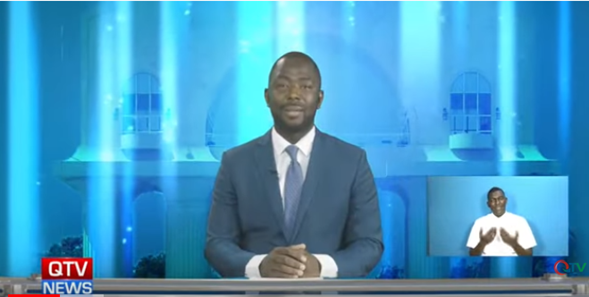Snippet of QTV Gambia Nightly News segment with Sign Language Interpretation by Lamin Sonko of ASLI.
The Gambia registers a largest number heard of hearing persons. According to Gambia Association of the Deaf and Hard of Hearing persons (GADHOH), approximately 39,000 (about 2%) of the population are deaf. UNDP has been working with such partners to promote inclusivity and ensures that no one is left behind, as the SDG relies on the involvement and inclusion of persons with disability to be fully realized., UNDP through its Accelerator lab partnered with the Association of Sign Language Interpretation (ASLI) of the Gambia to design an experiment as part of its portfolio on disability inclusion. The experiment consists in promoting inclusivity in governance within that community through sign language interpretation of the nightly news using a signal box.
This experiment came at a time when the country was embarking on the first post transition presidential election. The 2021 election year was a real test for The Gambia’s democratic system, and its peace and security structures. Among the registered voters, Total number of registered voters ahead of the December 2021 election was 962,157 (2021), including 545,318 women (56.68%) and 416,839 men (43.32%). The percentage registered youths (18-35 years) voters stand at 57.71% (555,220)
As a result, the election dominated the media establishments on both air and print media, but also on social media. The 8pm news hour is a source of news for the majority of Gambians.
Through consultations with various actors and in the AccLab’s engagement with partners and disrupters at the grassroots level, it was realized that although hard of hearing persons were among those that would assemble around their TV set for the nightly news broadcast, many found it challenging to understand what was being reported. The AccLab explored the possibility of partnering with ASLI to interpret nightly news for the hard of hearing persons five months prior to election date.
Another partnership was key in realizing this initiative. The largest private TV station swiftly embraced the idea and took ownership of the project by agreeing to embedding an interpretation signal box without a cost as part of their corporate social responsibility. After the first month, the GADHOH and UNDP received overwhelming feedback from the hard of hearing community praising the initiative. The programme also captures the attention of the Gambian community, as for the first time seeing the signal box along with news presenter during the hour. This furthers many people’s curiosity and boost their eagerness to realize that this has been a missed opportunity for most of our loved ones in the hard of hearing community. The hard of hearing community also took to the social media endorsing the programme and express their gratitude, and felt they are now included in the news stories of the country. The feedback was extended to colleagues within the UN System in The Gambia and sparked a deep reflection on the way we were ensuring inclusivity in our programs and ensuring that no one was left behind.
With UNDP receiving encouraging feedback from all over the country, from diverse communities, a decision was made to further engage with the hard of hearing persons themselves. A sensemaking and feedback forum was organized to get a sense how this programme was received and the impact it was having in the stakeholder communities. A significant amount of insider knowledge was built during the interactive sense making exercise, a with very valuable suggestions about how they would like to engage moving forward. For instance, a point was made to the AccLab team to ensure that the interpretation was continued throughout the inauguration period and next phases of the electoral process.
This initiative ensures that people with this disability, particularly women, are also aware of the evolving issues and ensures their participation in the political discourse which was our primary objective. In the past months, the sign language interpretation has for the first time in The Gambia, captured the attention of many including the office of the President, many government institutions and other UN sister agencies. It is a positive step in ensuring that all people despite their disability could be included in the developmental process and contribute to the efforts for the achievement of the SDGs. One of the key unexpected outcomes of the experiment was the ability of the experiment to achieve a positive deviance within the community in contributing to covid-19 vaccine sensitization.
Secondly, it was later revealed that some members of the HoH community expressed interested to contest in the upcoming National Assembly and local elections. Futhermore, the AccLab was able to enact the handover mandate of the overall Accelerator Lab model by handing over the results of the experiment to UNDP Governance Unit to ensure continuity of the service throughout the electoral cycle.
As the UNDP continues to explore areas of intervention within the disability portfolio, this AccLab intervention has been a recognized success and will certainly open up new inclusive component.
Members of the hard of hearing community reacting to their Colleagues comments

 Locations
Locations





